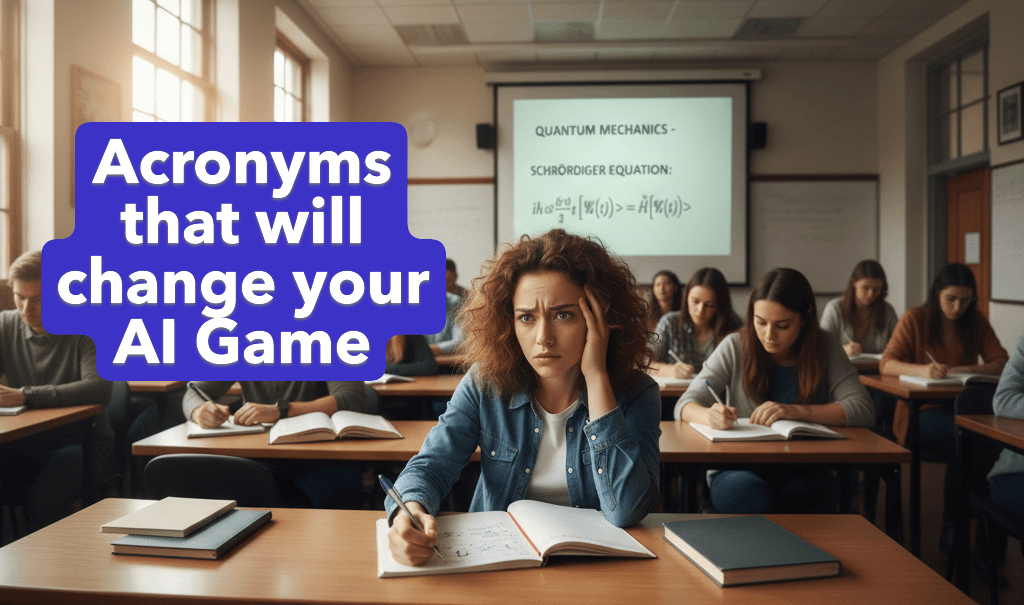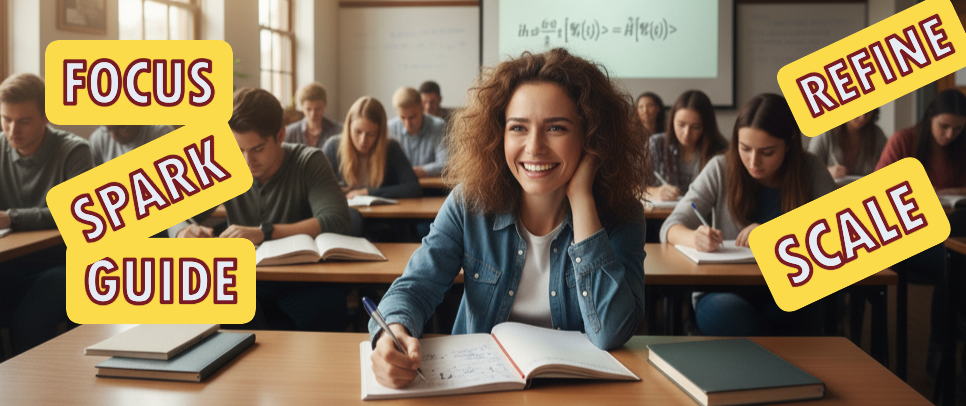From "IDK" in Seminars to AI Mastery: The Acronyms That Will Transform Your Academic Journey

A Tale of Two Acronyms
I still remember my first graduate seminar, staring at the whiteboard completely lost.
My advisor had written "Check the IRB re: your RQ before the PI meeting--ASAP!"
IRB? RQ? PI? I nodded knowingly while frantically googling under the table. Institutional Review Board. Research Question. Principal Investigator.
That moment of acronym panic taught me something crucial about academia: we swim in a sea of abbreviations--from GPA and TA to ABD and R&R. They're our shorthand for complex concepts, saving precious time in our already overwhelming academic lives.
But here's what most graduate students don't realize: AI like ChatGPT and Gemini have become fluent in these acronyms too. And more importantly, AI responds brilliantly to structured acronyms designed specifically for academic success.
Today, I'm sharing the acronyms that transformed my interactions with ChatGPT from frustrating trial-and-error into precision tools that deliver exactly what my research needs.
Why Most Graduate Students Struggle with AI
The biggest mistake I see graduate students make is treating AI like Wikipedia. They ask vague questions like "What's important about postcolonial theory?" and wonder why they get surface-level responses they could have found in any undergraduate textbook.
AI works differently. It's like having a brilliant research assistant who needs context, clear objectives, and specific parameters to deliver meaningful insights. The more structured your input, the more sophisticated your output.
Think of it this way: if you can reduce the time it takes to get useful AI assistance from 45 minutes of confusing back-and-forth to 5 minutes of well-structured prompting, that's 40 minutes saved per query. For graduate students juggling research, teaching, and coursework, those saved hours could mean the difference between burnout and breakthrough.
The 5 Power Acronyms That Will Change How You Use AI in Academia
1. SPARK: When You Need Creative Research Angles
Perfect for: Dissertation topics, research proposals, conference abstracts
- Specific research area or question
- Perspective or theoretical framework
- Audience (committee, journal, conference)
- Requirements (length, format, disciplinary norms)
- Keep iterating with follow-ups
How to Use It: Instead of asking "Help me with my literature review," try:
Act as a critical theory scholar specializing in digital humanities. I need to identify gaps in the literature on algorithmic bias in natural language processing, specifically through a postcolonial lens. This is for my dissertation proposal committee in Media Studies. Requirements: must engage with both technical and cultural studies literature. Give me 3 potential research angles, then I'll ask you to develop the most promising one.
Notice how this targets exactly what you need for your specific academic context?
2. GUIDE: For Complex Academic Problem-Solving
Perfect for: Methodology design, data analysis strategies, theoretical frameworks
- Goal (what you want to achieve)
- Understanding (theoretical background and context)
- Input format (data type, sources, materials)
- Detail level (comprehensive review vs. overview)
- Examples (similar studies or approaches)
How to Use It:
I want to design a mixed-methods approach for studying academic burnout among STEM PhD students. I'll share my preliminary survey data from 200 respondents and themes from 15 interviews. I need a detailed methodological framework that integrates quantitative and qualitative findings for a sociology journal submission. Include examples of similar mixed-methods studies on graduate student mental health published in top-tier journals.
3. FOCUS: For Laser-Sharp Literature Reviews
Perfect for: Systematic reviews, annotated bibliographies, research mapping
- Format desired (narrative, table, thematic)
- Objective or research question
- Constraints (publication years, journals, methodologies)
- Use case (dissertation chapter, journal article, grant proposal)
- Sources or databases preferred
How to Use It:
Create a thematic literature matrix for papers on imposter syndrome in academia. Focus on empirical studies from 2018-2025 published in psychology and higher education journals. I need this organized by methodology, sample demographics, and intervention strategies. This is for Chapter 2 of my dissertation on graduate student retention. Present it as a table I can adapt for my committee.
4. REFINE: For Perfecting Academic Writing
Perfect for: Journal submissions, grant proposals, thesis chapters, conference papers
- Review what I provided
- Explain what needs adjustment
- Feedback on specific elements
- Improve with specific changes
- New version request
- Evaluate against academic standards
How to Use It:
Review this abstract I'm submitting to the American Educational Research Association conference. It feels too broad and doesn't clearly state my contribution to the field. Strengthen the theoretical framework, make the methodology more explicit, and ensure it follows AERA's emphasis on educational equity. Rewrite it to be exactly 150 words. Then evaluate whether this version better meets typical acceptance criteria for competitive education conferences.
5. SCALE: For Research Expansion and Career Planning
Perfect for: Dissertation to book proposals, pilot to full studies, postdoc planning, research program development
- Situation (current research stage and achievements)
- Capacity (time, funding, resources, collaborators)
- Ambitions (publication goals, career targets)
- Limitations (institutional constraints, market realities)
- Execution (actionable steps and timeline)
How to Use It:
I'm a third-year PhD student in Environmental Science with one first-author publication, currently analyzing data from my NSF-funded fieldwork. I have 2 years of funding remaining and access to our university's supercomputing cluster. My goal is to publish 3 papers before defending and secure a postdoc at an R1 institution focusing on climate modeling. Key constraints: limited programming experience, need to maintain teaching assistantship, and competing in a highly saturated academic job market. Give me a detailed publication strategy with monthly milestones, skill development priorities, and networking activities that balances dissertation completion with career positioning.

The Classic Academic Shortcuts That Still Work
Don't forget these tried-and-true classics that transfer perfectly to AI interactions:
- ELI5 (Explain Like I'm 5): Perfect for understanding complex theories or explaining them to undergrads
- TL;DR (Too Long; Didn't Read): Essential for summarizing dense papers, chapters, or theoretical texts
- Compare and contrast: For literature reviews and theoretical analysis
- Step by step: When breaking down complex methodologies or statistical procedures
The 10-Minute Challenge
Here's my challenge to you:
- Think of an academic problem you're facing right now
- Ask AI about it using your normal approach
- Then ask again using the relevant acronym framework
- Compare the quality and usefulness of responses
I guarantee the structured approach will give you significantly more actionable academic insights.
Why This Matters for Your Academic Future
Graduate students who master these frameworks consistently report:
- Cutting literature review time by 40-60%
- Generating more innovative research questions
- Writing clearer, more focused proposals
- Receiving better feedback from advisors
- Publishing more efficiently
Every vague prompt is wasted time you could spend on actual research. Every generic response is a missed opportunity for deeper insight. But every structured interaction? That's progress toward your degree.
Your 7-Day Academic Implementation Plan
- Day 1-2: Master SPARK for developing your next research question
- Day 3-4: Use GUIDE to refine your methodology
- Day 5: Apply FOCUS to organize your literature review
- Day 6: REFINE a piece of academic writing
- Day 7: Use SCALE to plan your next semester or research phase
The Plot Twist Nobody Tells You in Grad School
Remember my IRB confusion? That moment of acronym ignorance taught me something crucial: the power isn't in memorizing acronyms--it's in understanding the structures that make academic thinking precise.
These AI frameworks aren't just letters. They're thinking tools that force you to clarify your research questions before you pursue them. They work because they make you better at academic communication, not just with AI, but with your advisor, your committee, and peer reviewers.
Start Today With This One Simple Test
Before you close this article, try this:
Open your AI tool of choice. Think of your most pressing academic challenge--that literature review you've been avoiding, that methodology you can't quite figure out, that theory you need to understand by tomorrow's seminar.
Use the SPARK framework to address it.
See what insights emerge that you wouldn't have discovered through random googling or vague questions.
The Bottom Line
We've evolved from "IDK" panic in seminars to sophisticated AI collaboration in less than a decade. The graduate students who thrive in academia won't be those who avoid AI--they'll be those who know how to leverage it as a research amplifier rather than a crutch.
AI isn't going to write your dissertation for you (nor should it), but graduate students who know how to effectively collaborate with AI will have a significant advantage in research productivity, idea generation, and academic writing. These acronym frameworks aren't just communication tools--they're competitive advantages in an increasingly demanding academic landscape.
The students succeeding with AI aren't necessarily those at the most prestigious institutions or with the biggest research budgets. They're the ones who have figured out how to articulate precisely what they need, when they need it, and in the format that advances their research.
Master these frameworks, and you'll never waste another late-night hour on unproductive AI interactions again. More importantly, you'll develop the kind of structured thinking that makes great researchers--whether you're heading for academia, industry, or somewhere in between.
P.S. What academic acronyms confused you when you started grad school? And which of these frameworks will you try first? Start with the one that addresses your most immediate academic challenge--your future self will thank you when you're defending your thesis ahead of schedule.
Related posts
- Master’s vs PhD in the USA for International Students: How to Choose
Choosing between a Master’s and a PhD in the USA as an international student? Compare admissions pathways, funding, timelines, and career outcomes—then pick the right route.
- WES Evaluation Guide 2026: Costs, Timeline & GPA Conversion
Complete WES credential evaluation guide (2026). Learn report types (Document-by-Document vs Course-by-Course), current starting costs, timeline (4-7 weeks), step-by-step application process, and how WES converts foreign grades to US GPA.
- How Long Does It Take to Get a PhD After a Master's Degree?
Discover the real timeline for completing a PhD when you already have a master's degree. Learn how prior graduate education affects PhD duration across fields, countries, and program types.